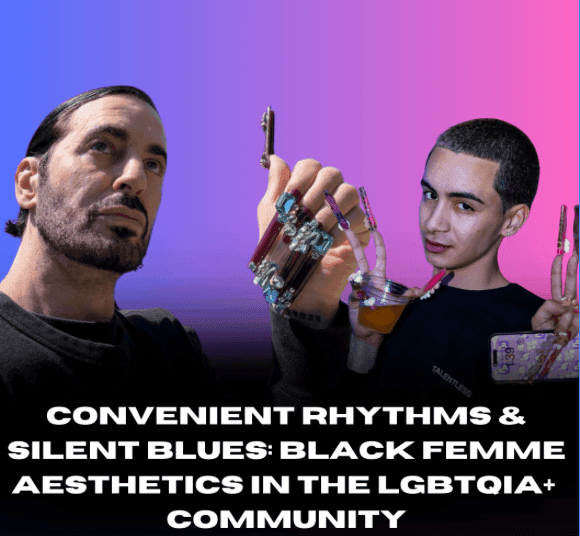Let's talk about the viral video of an openly gay man from New York, named 'TheRyanJayShowOfficial' being endorsed by Marc Jacobs for his aesthetic appearance of long nails comparable to Cardi B's as well as a discussion of silent phobias that bleed within the LGBTQIA+ community. For context, the visibly non-Black Latino content creator, 'TheRyanJayShowOfficial' commented on topics regarding transwomen using the women's restrooms as well as claiming Black people don't take care of their children in response to another Tiktok video regarding White people adopting Black children. TS Madison reposted a TikTok video of a Black women named FairyPuss commenting on 'TheRyanJayShowOfficial' video which caused more virality due to TS Madison' privileges as a commentator in LGBTQIA+ media. Although, all content creators are entitled to their opinions, others are equally entitled to remix videos they wish to comment on which is a purposeful feature on both Instagram and TikTok apps.
However, as the content creators argue online, I notice a larger conversation at hand. The responses that Black women content creators receive from their peers is overwhelmingly clouded in vitriol in comparison to the hundreds of responses most viral content creators receive. Silent phobias plague TikTok and Instagram with antiblackness, homophobia, transphobia, fatphobia and colorism which is often shown by the manner in which creators develop content or respond to it. In this particular instance, the personality of 'TheRyanJayShowOfficial' is clearly based on his ethnic accent, long nail aesthetic and dramatic manner in which he discusses topics. His content posture is not based on professionalism or unity speech, but it's clearly a space for controversy to provoke the audience like many others.
For decades, Black women of every community have spoken eloquently about the commodification of Black femme aesthetics amongst other ethnic groups which is often attributed to proximity in neighborhoods, music, fashion or popular media. Many people use the excuse of living amongst Black Americans or growing up in poor environments as a justification to say the 'N' word, use Black American slang (not accents, but specific colloqials) or conveniently claim Blackness through ancestral lineage to prove a point. Yet, it's very rare that Black people adopt culturally sensitive language about other ethnic groups or wear art expressions without giving credit where it's due.
The issue is not the appreciation of Black culture, but the miseducation of Blackness. Often times, conflating "ghetto" aesthetics with Blackness is a tool to dismiss the creation of Black artistic expression and a manipulative agression to silence the beauty of Black cultural movements that are gravely accompanied by a contextual history of forceful tolerance. In other words, it's easy to ignore the accomplishments of Black women in the fashion space while congratulating non-Black people for the imitation of Black femme aesthetics.
Seemingly, TS Madison and Fairypuss aren't the only people who have commented on 'TheRyanJayShowOfficial' specifically on their videos regarding transwomen in women's restroom nor the controversial video claiming Black people aren't taking care of their children which he stated leads to White people adopting neglected children. In the process, TS Madison and Fairypuss were called ignorant for their commentary, but it's time to unpack the concept of Black women trendsetters lacking protection within the LGBTQIA+ community despite the overwhelming imitation of Black femme aesthetics.
Where does Marc Jacobs fall into this? As the virality of 'TheRyanJayOfficialShow' content circulated TikTok regarding their remarks on transwomen and Black parenting, Marc Jacobs post videos with long nails and claiming he was inspired by the 'Ryan Jay' content creator. Marc Jacobs have been known to wear luxurious nail art on his natural nails and even produce nail polish products. He debuted long nails at the 2024 Met Gala with no mention of inspiration, however, in a recent video in the weekend of May 24, 2024, Jacobs made a public statement of his inspiration for long nails with large stones was attributed to 'TheRyanJayShowOfficial'. Marc Jacobs have arguably always been a fashion icon but has rarely ever dabbled in Black femme aesthetics or to be specific, aesthetics with deep roots in Black culture.
The microaggressions of wilful ignorance of Black art is a choice especially for fashion pioneers like Marc Jacobs, Kim Kardashian, Gwen Stefani, Jennifer Lopez and the list goes on. Credibility of Black artistic expressions are conveniently shadowed over and credited to those who famously imitated styles for their non-Black audiences. Marc Jacobs choosing to make a statement of his inspiration was beyond a slap in the face to Black women who spearheaded the long nail trend in American culture, but it also felt like a similar sentiment that other White designers state towards their disgust of Black consumers in their designs. Lastly, cultural representation is a sensitive topic within fashion, which is an oxymoron considering the amount of LGBTQIA+ designers and employees in almost every fashion house throughout the world. However, LGBTQIA+ cultural representation is not inclusive to the Black population within the community and Marc Jacobs' public endorsement was a silent agreement to ignore the Black femme role in nail art fashion.
Written by Nakira G.
May 26, 2024
Keywords: cultural appropriation, latinx, Black aesthetics, femme, feminine, nail art, long nails, Cardi B Nails, culture, art, beauty

